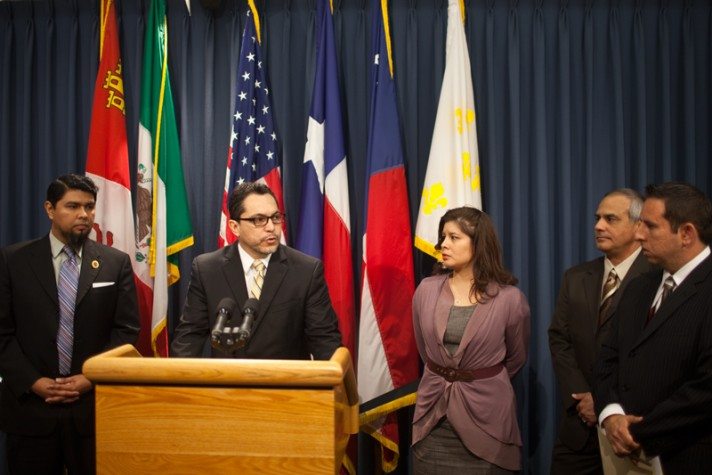A New Agenda for Texas’ Hispanic-Majority Schools
 |
| The Latino Coalition for Educational Equity's press conference outside the Texas Senate in February 2013. Patricia Lopez, who led research on the new education survey, is third from left. |
In February 2013, while Texas lawmakers kicked around major changes to public eduction, a handful of Latino activists and educators banded together outside the Senate chamber to send a message that they were getting left out. After weeks of committee hearings dominated by business groups and mostly white parents and students, this super-group of advocates calling itself the Latino Coalition for Educational Equality united to say they’d had enough.
New graduation requirements were in the works, threatening a return to Texas’ old system of “tracking” Hispanic students into vocational programs instead of college prep. In budget talks, lawmakers were considering how much money to budget for schools. And even when they considered the fast-growing proportion of Hispanic students, few legislators consulted with the state’s wealth of Latino education experts. Hispanic students appeared in talking points mostly as test scores or arguments for more funding. But by the close of the session, the Latino coalition’s pleas did little to change the conversation.
So, just five months from another Lege session, Hispanic groups want to change that dynamic for good. During the 2015 session Hispanic students will make up a clear majority of Texas’ schoolchildren, and Latino advocates say it’s time their voices were heard.
To that end, the band got back together after the session ended to develop a unified agenda for 2015. Led by the Mexican American Legislative Caucus and the Senate Hispanic Caucus, a coalition of Latino groups met for a summit last October, split their effort into areas like health care, immigration and civic engagement, and gathered ideas from a broad selection of Latino advocates around the state. Organizers say the education study alone—with 70 groups and interviews with 120 bilingual teachers—is the most far-reaching survey of Latino and Latina groups in memory.
You can read the full report here—there’s a list of participating groups on page 7.
“The Latino community, we’re always talked about like we don’t vote, we don’t show up, and we constantly have to push back on dominant stereotypes,” says Patricia Lopez, the former University of Texas researcher who ran the education survey. “We have to be out there. These organizations are doing a lot of work that’s off the grid, not in the spotlight.”
The survey results include a mix of big needs, like improving access to college, and small-bore policy ideas—like Latino Education Groups' Agenda: More Money, Better Teachers:
